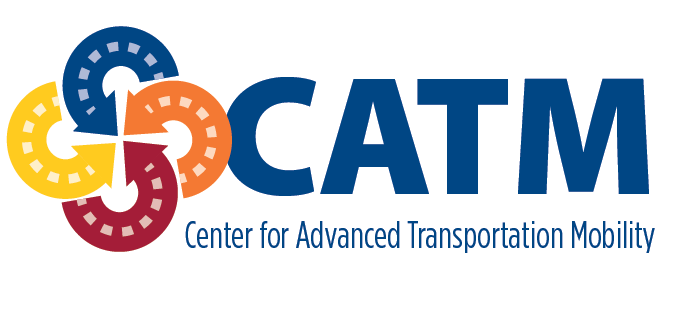The Center for Advanced Transportation Mobility (CATM) research activities will focus on improving how people and goods are transported throughout our nation, with special emphasis on disadvantaged populations. The primary research topics include last mile connectivity, mobility assistance, and emergency management optimization.
Submissions from 2024
Rural Older Adult Driver Tailored Research-Integrated Plan (ROAD TRIP), Jon Antin Ph.D
Evaluation of Web-Based Driving Feedback for Teens and Their Parents, Charlie Klauer Ph.D
Acoustic Situation Awareness and its Effects on Pedestrian Safety within a Virtual Environment, Rafael Patrick Ph.D
Connected Electric Vehicles: Personal Listening Device Vehicle-to-Pedestrian Communication Systems in Virtual Reality, Rafael Patrick Ph.D
Real-time Deep Reinforcement Learning for Evacuation Under Emergencies, Yujing Zhou
Submissions from 2023
A Multiobjective Reinforcement Learning Framework for Equitable Toll Design for Express Lanes, Venktesh Pandey Ph.D
High-Speed Rail in the U.S. – Mode Choice Decision and Impact of COVID-19, Jing Yu Pan
Mode Shift Intentions to High-Speed Rail in the US – Mediation and Moderation Analyses, Ying Yu Pan
Vulnerable Road Users Transit Optimization with Healthcare Privatization (VRUTOP), Hyoshin Park Ph.D.
Detecting Early-Stage Dementia Using Naturalistic Driving, Brian M. Wotring M.S. and Jonathan F. Antin Ph.D.,CHFP
Submissions from 2022
Automated Last Mile Connectivity for Vulnerable Road Users, Andy Alden
Epidemiological Models for Transportation Applications: Secondary Crashes, Sirish Namilae, Dahai Liu, and Scott Parr
Vulnerable Road User Mobility Assistance Platform (VRU-MAP), Justin Owens and Andrew Miller
Equitable Dynamic Pricing for Express Lanes, Venktesh Pandey, Bader G. Alamri, Hadi Khoury, and Mary Bakre
Mask-Wearing Behaviors in Air Travel During Coronavirus Pandemic – An Extended Theory of Planned Behavior Model, Jing Yu Pan and Dahai Liu
Submissions from 2021
Multi-scale and Collaborative Disaster Evacuation Planning Framework, Dahai Liu, Kai Zhang, Yongxin Liu, Yupeng Yang, and Houbing Song
Discrete Dynamics and Epidemiological Multi-Physics Models for Transportation Applications, Sirish Namilae and Dahai Liu
Usability of Urban Air Mobility: Quantitative and Qualitative Assessments of Usage in Emergency Situations, Scott R. Winter, Stephen Rice, Sean R. Crouse, Austin Vaughn, and Nadine K. Ragbir
Multi-scale and Collaborative Disaster Evacuation Planning Framework, Kai Zhang, Yongxin Liu, Yupeng Yang, Dahai Liu, and Houbing Song
Submissions from 2020
Multiscale Model for Hurricane Evacuation and Fuel Shortage, Sirish Namilae, Dahai Liu, and Scott Parr
Analysis of the Non-Driving Mobility Needs of People with Disabilities, Justin Owens, Andrew Miller, and Carolyn Shivers
Submissions from 2019
Multi-Scale Models for Transportation Systems Under Emergency Conditions, Lauren Davis and Xiuli Qu
Multi-scale Models for Transportation Systems Under Emergency Conditions, Dahai Liu, Sirish Namilae, Yixuan Cheng, Sang-A Lee, Pierrot Derjany, Jie Chen, Jennifer Thropp, and Younho Seong
Particle Dynamics Model for Hurricane Evacuation and Fuel Shortage: Model Based Policy Analysis, SIrish Namilae and Dahai Liu
A Personalized Trip Planner For Vulnerable Road Users, Hyoshin John Park
Travelers' Rationality in Online Anticipatory Emergency Response Model, Hyoshin John Park
Real‐Time Recommendations for Traffic Control in an Intelligent Transportation System during an Emergency Evacuation, Dr. Xiuli Qu, Lauren Davis, and Younho Seong
Assessing Pedestrians' Perceptions and Willingness to Interact with Autonomous Vehicles, Scott R. Winter, Stephen Rice, Nadine K. Ragbir, Bradley S. Baugh, Mattie N. Milner, Bee-Ling Lim, John Capps, and Emily C. Anania
Submissions from 2018
Asymmetric Information Sharing in Dialysis Paratransit Using an Agency Approach, Mary Lind and Rhonda Hensley


